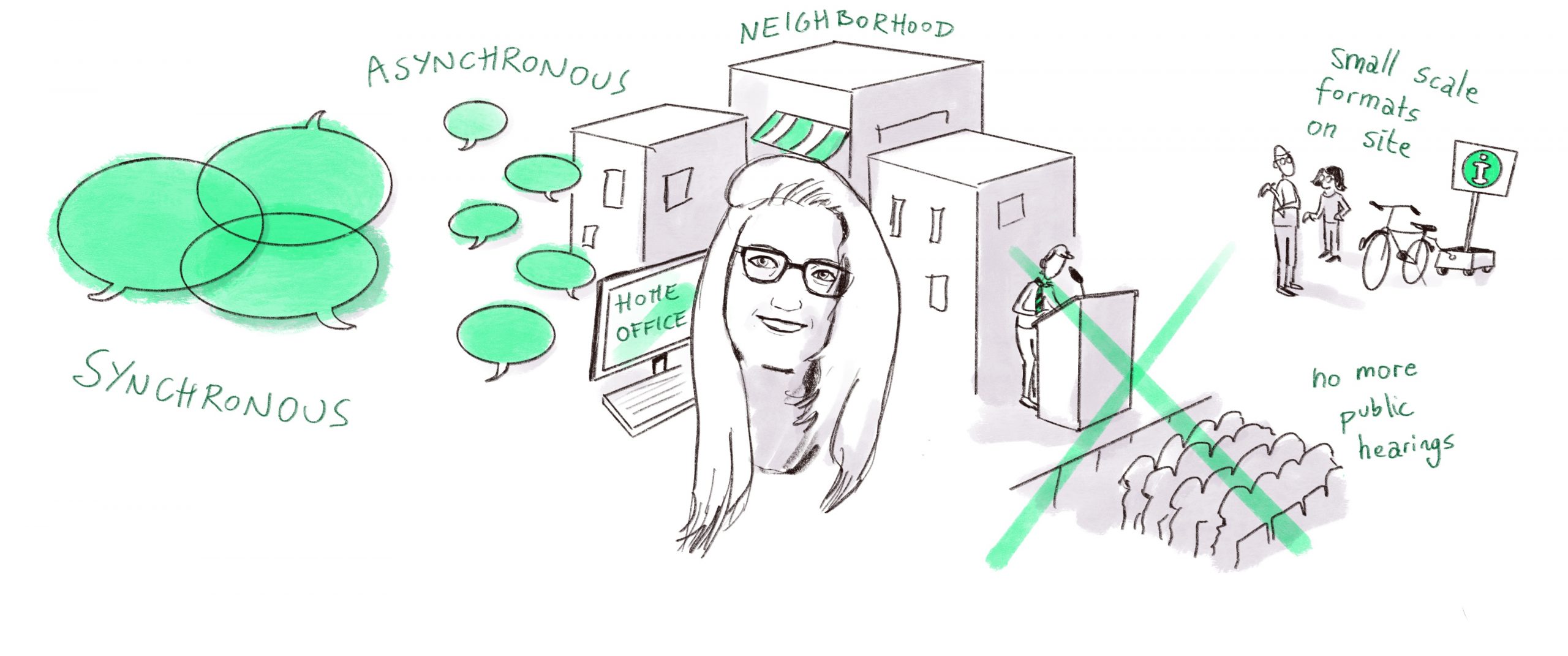
Reimagining a Culture of Participation
Die Kultur der Beteiligung neu denken
Podcast in German: Sarah Ginski, April 16 2020
The cross-media approach, combining online and offline formats, has proven to be an effective way to run citizen participation processes in the past. But how can it work, when events in physical space are not currently an option? This may be a chance to rethink virtual as well as in-person participation.
Ein crossmedialer Ansatz aus Online- und Offline-Formaten hat sich als effektiver Weg der Bürgerbeteiligung erwiesen. Doch wie kann er funktionieren, solange Veranstaltungen im physischen Raum nicht möglich sind? Es bietet sich die Chance, virtuelle wie auch analoge Beteiligung neu zu denken.

With many activities moving online, one might argue that space has lost some of its relevance. But for Sarah Ginski, the opposite seems to be the case: the office at home, the neighbourhood, or the walk to the corner store have become much more meaningful. As have social ties within the neighborhood – there is a newfound importance in knowing people who can help.
Zebralog, the agency Sarah Ginski works at, has been an early player in online participation since launching their first platform in 1998. But they always relied on a mix of online and offline formats. As physical events are not possible for the time being, they find themselves rethinking this question: can participation be done purely online? The solution they developed was to maintain a cross-media approach, but instead of online and offline, they mix synchronous and asynchronous online formats. According to Ginski, this mix can foster creativity and forces people to think through the messages they want to convey. But for the future, it will be important to reimagine offline formats as well. Ginski sees an opportunity to discard large public hearings as a form of citizen participation, in favor of small-scale formats that seek out communities in their own spaces. After all, digital and analogue formats each overcome certain barriers. For instance, Ginski notes, asynchronous media such as forums have a slightly better gender ratio than traditional participation methods.
Many citymakers now have an advantage, because they are able to make these [digital] spaces their own.
Sarah Ginski 04/2020
Many citymakers Sarah Ginski observes in her work have already been a part of digital networks, giving them the advantage of having tried and trusted communication channels and even enabling them to offer support to those who don’t. At the same time, many volunteer initiatives struggle to navigate issues such as data protection, unable to afford or develop secure solutions.
In her line of work, Ginski notices an increased flexibility: it has become easier to set appointments, anything is possible, nothing needs to be perfect. But she also perceives many clients putting off decisions and events and attempting to use the situation as a pretext to evade citizen participation. Still, she is optimistic that the participatory and communicative culture of planning will remain. Citizens will continue to demand participation, already asking for alternatives. It is too early to tell which aspects of cities and urban planning will change for good. In the retail sector, certain dynamics may be reinforced that had already been underway in cities. Sarah Ginski hopes that the general attitude of flexibility and openness to experimentation can be harnessed and will persist after the crisis.
This could be a chance not to continue as before, but instead come up with even more creative and well thought-out participation formats, […] to carry forward the culture of participation that has been accomplished.
Sarah Ginski 04/2020
Dr. Sarah Ginski is an urban planner and participation expert. She works as a project manager at Zebralog, where she conceives and facilitates participation in urban development processes. Dr. Ginski has previously worked as a research assistant at the Chair for Planning Theory and Urban Development.